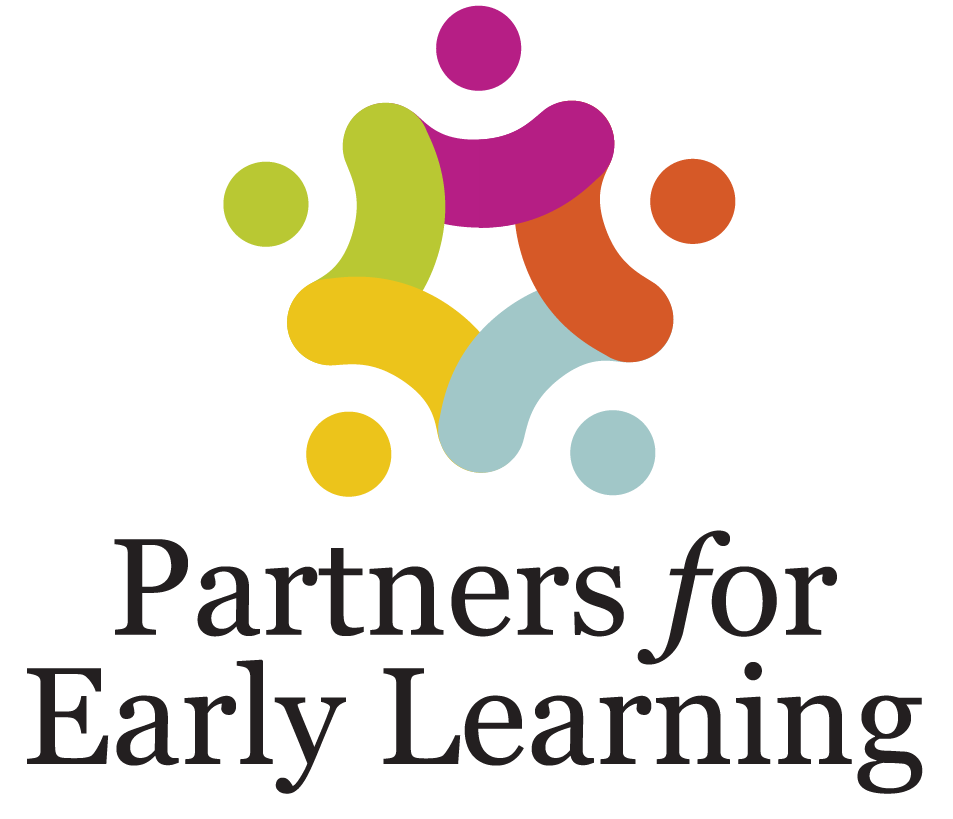Age
Age Milestones For Your Child

Physical: Overview (0-6 Months)
Physical development includes everything from the growth of the five senses–vision, hearing, touch, taste, and smell–to a child’s overall ability
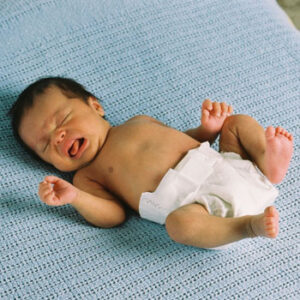
Touch: Feels Pain (0-1 Month)
It was once believed that premature newborns could not feel pain. Today, however, researchers have located specific pathways in the
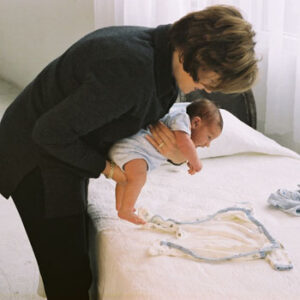
Vision: Color Vision Is Limited (0-1 Month)
Newborns do see the world in some color, but they have trouble discriminating blues from greens and reds from yellows.
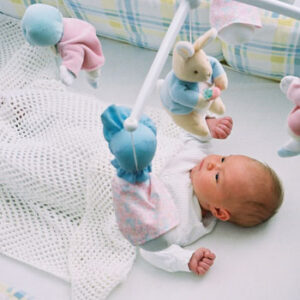
Can Take Swipes at Dangling Objects with Hands (1-5 Months)
In their first month or two, babies attempt to reach for dangling toys or other interesting objects (this is called
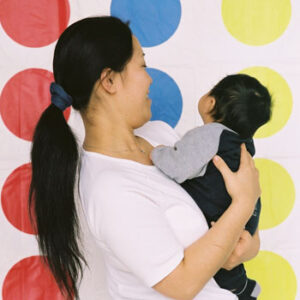
Vision: Attracted to High-Contrast Patterns or Edges (0-2 Months)
Several experiments show that babies will turn toward patterns with high contrast and away from simple patterns with little contrast.

Vision: Focuses on Objects from 8 to 15 Inches Away (0-2 Months)
Babies are born with limited vision, but soon after birth, they can focus on objects about 8 to 15 inches
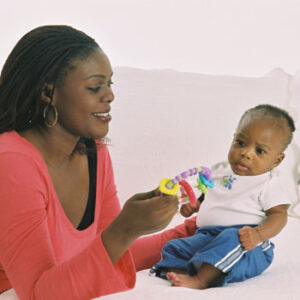
Vision: Tracks Slowly Moving Objects (0-2 Months)
Although vision is limited at first, moving objects catch newborns’ attention. Babies are likely to track an object with their eyes
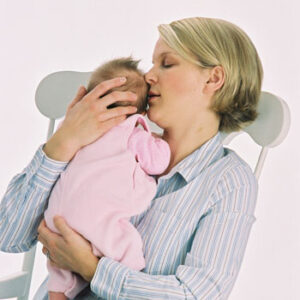
Hearing: Well-Developed, except for Very Quiet Sounds (0-3 Months)
Even before birth, babies have been shown to respond to sound stimuli within a limited range of sound frequencies. At
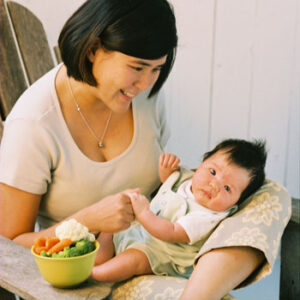
Smell: Prefers Sweet Smells over Bitter or Acidic Smells (0-3 Months)
Newborns are attracted to the smell of breastmilk, and experiments show that they will vigorously turn away from bitter or
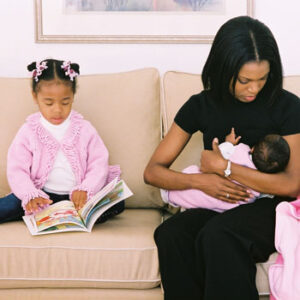
Smell: Recognizes Scent of Mother’s Breastmilk (0-6 Months)
Young babies are attracted to the scent of their mothers’ breastmilk and prefer it to other women’s milk. In one
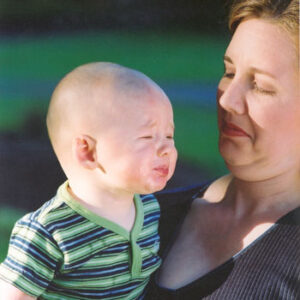
Taste: Prefers Sweet over Bitter Tastes (0-3 Months)
Infants are born with some basic taste preferences. In one research study, babies would suck faster and stronger for sweet
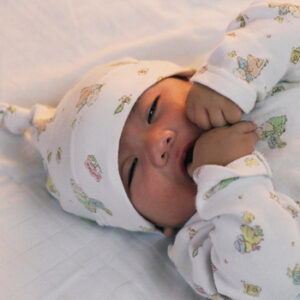
Displays Rooting and Sucking Reflexes (0-4 Months)
Babies are born with a variety of innate reflexes. The rooting reflex prompts a baby to turn his head from
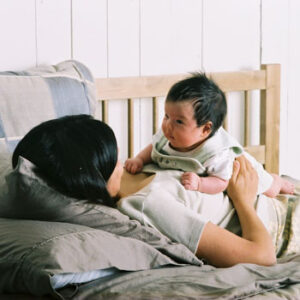
Can Raise the Head from a Prone Position (0-2 Months)
Soon after birth, most babies can raise their heads for brief periods when lying prone (on their stomachs). This is
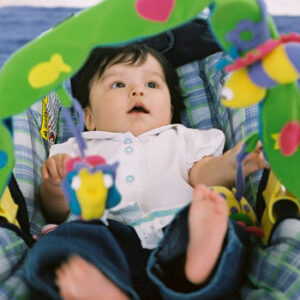
Vision: Can Discriminate among Basic Colors (1-5 Months)
Infants soon after birth have limited color vision, and they have trouble discriminating blues from greens and reds from yellows.
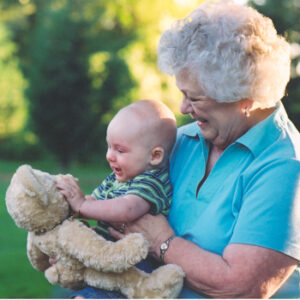
Vision: Can Focus on Objects up to 3 Feet Away (1-5 Months)
By the end of a baby’s first month, she can focus briefly on objects up to three feet away. Over
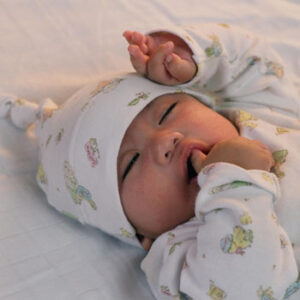
Brings Hand to Mouth (1-3 Months)
During the first few months of life, babies persistently attempt to bring their hands to their mouths but have not

Opens and Shuts Hands (1-3 Months)
During the first 3 months of life, babies’ hands and arms develop rapidly. Initially, their hands are often tightly clenched
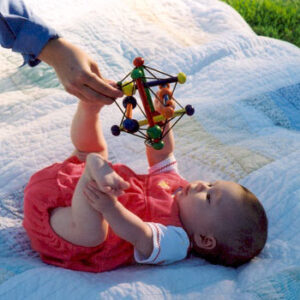
Grasps and Shakes Hand Toys (1-4 Months)
Between their first and third months of life, babies gain the skills to grasp and shake hand toys; they may
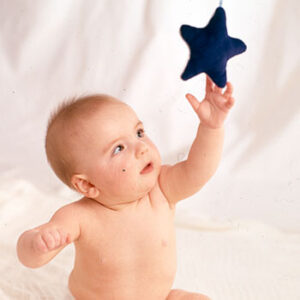
Vision: Can Use Movement to Identify Objects (1-5 Months)
One of the challenges babies face is discriminating against separate objects from what surrounds them. Experiments have shown that by
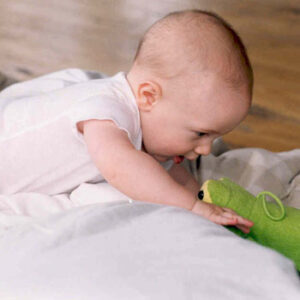
Touch: Can Distinguish between Lumpy and Smooth Objects with Mouth (1-7 Months)
Within their first few months, babies can integrate some types of sensory information. One experiment showed that babies can match
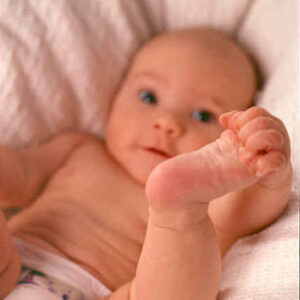
Can Reach Voluntarily for Things (3-6 Months)
In their early months, infants may reach for things, but these early attempts (called pre-reaches) are generally uncoordinated swipes at
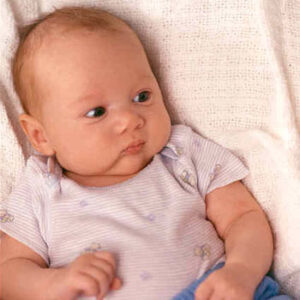
Vision: Depth Perception Begins to Develop (3-7 Months)
Babies as young as 2 to 3 months have shown some form of depth perception. One method researchers have used
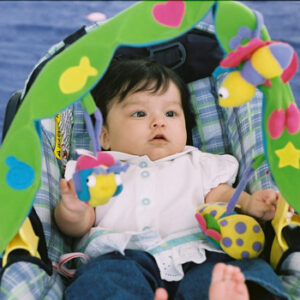
Vision: Develops Full-Color Vision (4-7 Months)
Color vision doesn’t fully develop until about four months. After four months, babies can distinguish between even closely related colors,
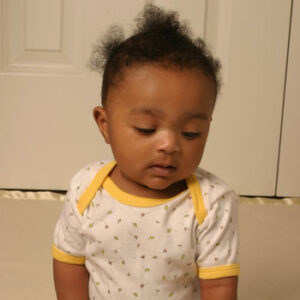
May Sit Easily without Support (5-7 Months)
Babies’ growing curiosity and abilities lead them to try new things, so parents and caregivers should arrange the environment to
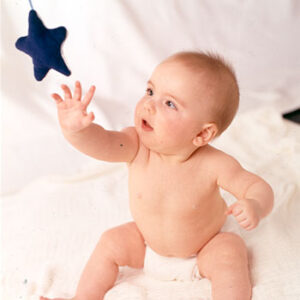
Can Reach Out and Grasp Moving Objects (5-8 Months)
Around 5 months, most babies become more skilled in their reaching and grasping attempts. This includes the ability to grasp

Physical: Overview (6-12 Months)
Between 6 and 12 months, babies reach many important milestones. Most can sit without support and eventually become mobile, from
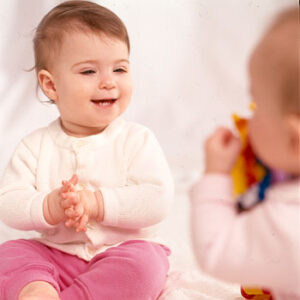
Can Sit Alone (7-10 Months)
At this age, most babies are stable and can sit for longer periods of time. This is a major achievement,

Crawls Forward on Belly (8-10 Months)
Between 8 and 12 months of age, babies are in constant motion. They arch their necks to investigate their surroundings when
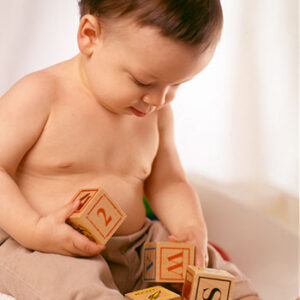
Lets Objects Go Voluntarily (8-11 Months)
As babies gain the skills to open and close their fingers, they often delight in dropping and throwing small objects. They
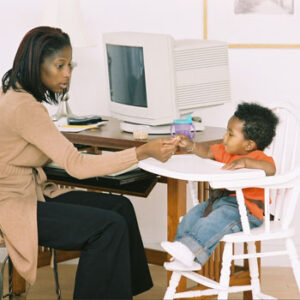
Uses Pincer Grasp (8-11 Months)
At 8 months, most babies have not acquired the hand and finger skills to use the pincer grasp, instead clumsily
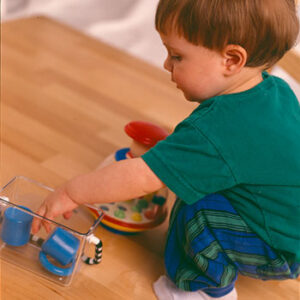
Places Objects Into and Out of Containers (8-12 Months)
As they approach 12 months, babies use their improved coordination to thoroughly investigate the objects they encounter, picking them up,
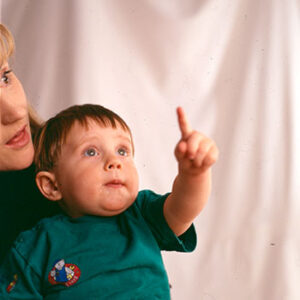
Capable of Poking with Index Finger (8-13 Months)
Most babies around 12 months use their improved coordination to thoroughly investigate the objects they encounter, picking them up, banging
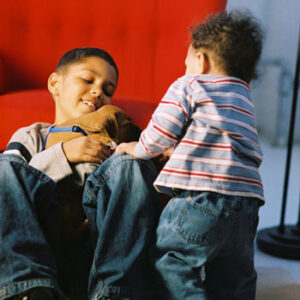
Walks Holding onto Furniture (9-11 Months)
Although crawling gives babies a new perspective on the world around them, they observe people walking and strive to do
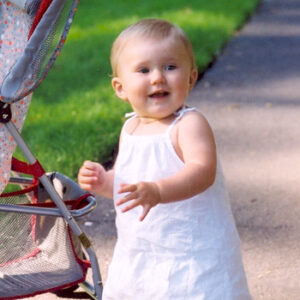
Stands Alone Easily (10-12 Months)
Babies will learn to stand momentarily without support until they have enough confidence to stand for longer periods and eventually
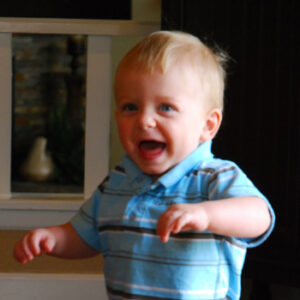
Begins Walking Alone (10-13 Months)
At first, a baby may walk with his feet wide apart to help with balance. As he becomes more confident,
Physical: Overview (12-24 Months)
In their second year, children’s sensory abilities reach full maturity, and their first wobbly steps progress to efficient walking, standing
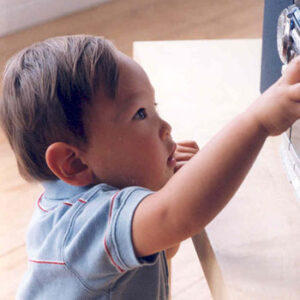
Uses Thumb and Forefinger to Explore Objects and Turn Knobs and Dials, etc. (12-20 Months)
Toward the end of the first year, babies become more skilled at using their thumbs and forefingers to investigate objects.
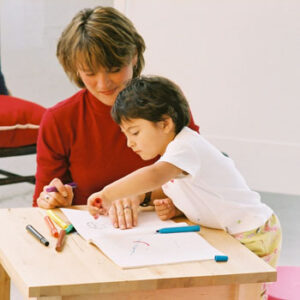
Capable of Copying Simple Horizontal and Vertical Lines and Building Towers (14-24 Months)
By the end of the second year, children are gaining more and more control over simple movements and integrating these
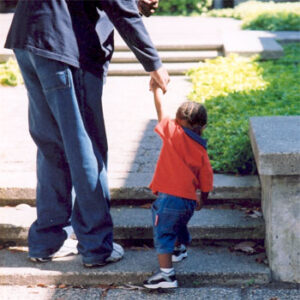
Can Walk Up and Down Stairs Holding On to Support (15-24 Months)
Approximately 6 months after their first steps, most toddlers adopt a much more mature walking style, keeping their feet closer
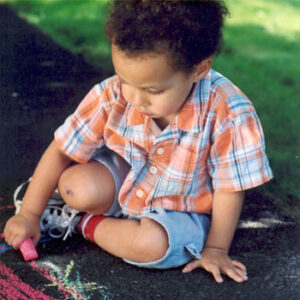
Can Scribble with a Crayon (16-20 Months)
Throughout their second year, children become more skilled with their hands. This includes being able to hold crayons and scribble
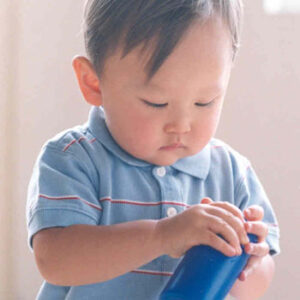
Can Turn Over Containers to Pour Out Contents (16-24 Months)
Although it’s easy to see improvements in large motor skills, one-year-olds also improve their ability to use their hands and
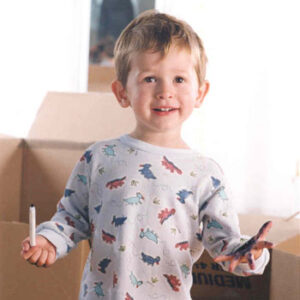
May Begin to Show Hand Preference but May Not Fully Decide for Several More Years (17-33 Months)
Most infants show no clear hand preference (left- or right-handedness) for years. Instead, many seem to alternate between favoring the
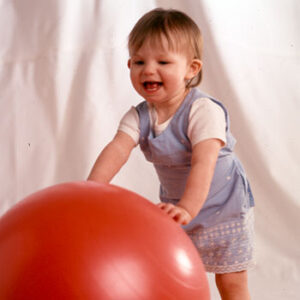
Masters the Skill of Unassisted Walking (18-24 Months)
Most babies start walking unassisted sometime between 12 and 18 months; mastering this skill is the major physical milestone of
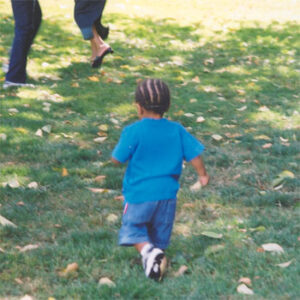
Begins to Run (20-24 Months)
Approximately 6 months after their first steps, toddlers develop a more mature walking style. They keep their feet closer together
Physical: Overview (2-3 Years)
By age 3, children can execute complex movements like unscrewing lids, turning pages one at a time, and copying vertical,
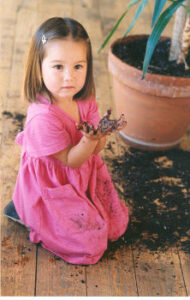
A Good Helper (2-3 Years)
Will wonders never cease? There is no magic moment when children become more likely to follow directions. But at around
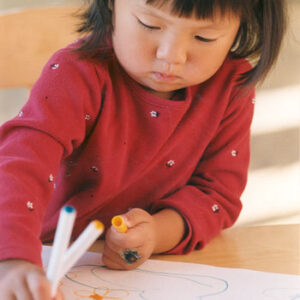
Can Make Vertical, Horizontal, and Circular Strokes with Pen or Crayon (2-3 Years)
During the second year of life, toddlers rapidly develop hand and finger skills. Drawing is a major accomplishment during this period,
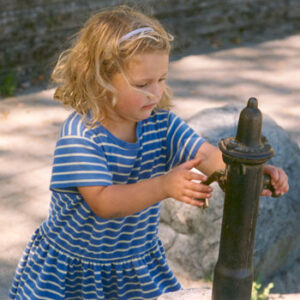
Capable of Turning Rotating Handles, such as Doorknobs (26-37 Months)
Toddlers rapidly develop hand and finger skills during their second year of life. They can now manipulate small objects with
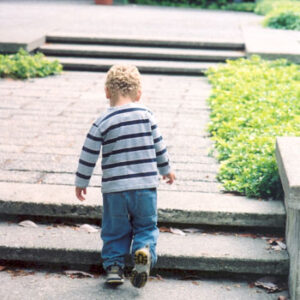
Capable of Walking Up and Down Stairs, Alternating Feet (27-36 Months)
During their third year, children are in constant motion–running, kicking, climbing, and jumping. They accomplish several major motor milestones during
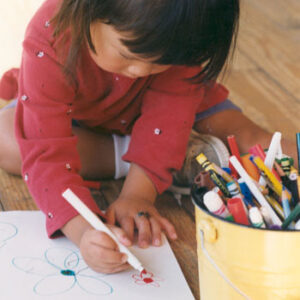
Capable of Holding a Pencil in Writing Position (28-38 Months)
During the second year of life, toddlers rapidly develop hand and finger skills. Drawing is a major accomplishment during this
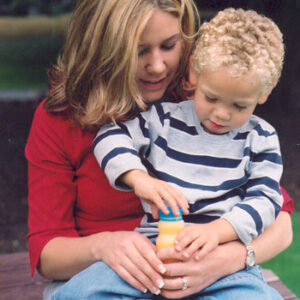
Can Screw and Unscrew Jars and Lids (29-36 Months)
Toddlers rapidly develop hand and finger skills during their second year of life. They can now manipulate small objects with ease,
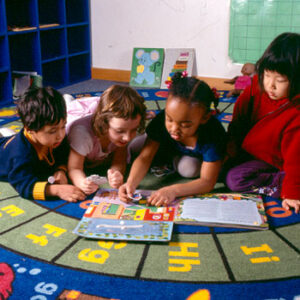
Capable of Turning Pages One at a Time (29-37 Months)
Toddlers rapidly develop hand and finger skills during their second year of life. They can now manipulate small objects with ease,
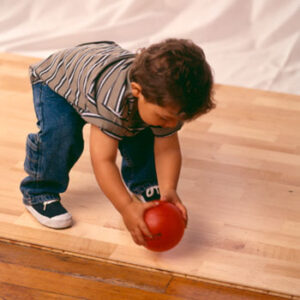
Bends Over Easily without Falling (30-36 Months)
Two-year-olds have adopted the heel-to-toe adult walking style instead of the characteristically stiff, spread-legged gait of young toddlers. Their growing coordination
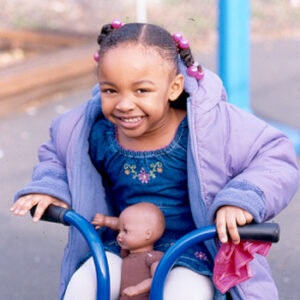
Capable of Pedaling a Tricycle (30-36 Months)
Children this age are generally very active, but this activity level will strengthen their body and help develop coordination. References
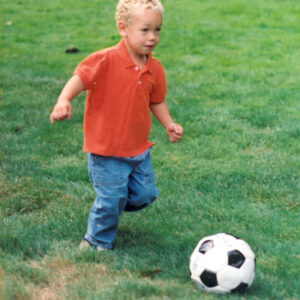
Runs Easily (32-39 Months)
During their third year, children are in constant motion–running, kicking, climbing, and jumping. They accomplish several major motor milestones during this
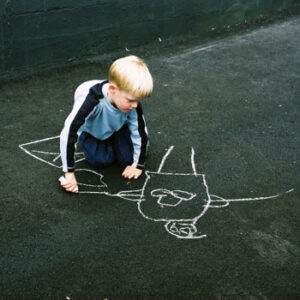
Physical: Overview (3-5 Years)
Children continue to develop their fine motor skills between years 3 and 5. Most learn to draw shapes and people,
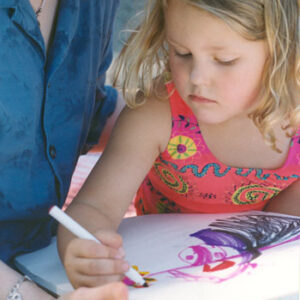
Becomes Primarily Left-Handed or Right-Handed (38-48 Months)
Most infants show no clear hand preference (left- or right-handedness) in their early years. Instead, many seem to alternate between
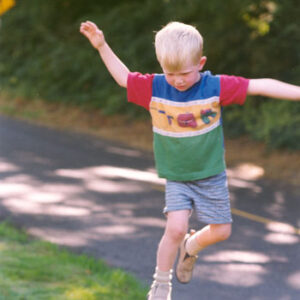
Capable of Standing on One Foot for Up to Five Seconds (39-47 Months)
By age 3, preschoolers have developed large motor skills enough to participate in organized games and some sports. They are now
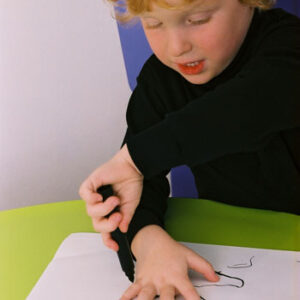
Capable of Using Scissors with Some Dexterity (40-48 Months)
Children develop muscular control and concentration to master some precise hand and finger movements during their fourth year of life.

Goes Up and Down Stairs without Support (40-48 Months)
By age 3, preschoolers have developed the large motor skills to control and direct many of their movements. Many are
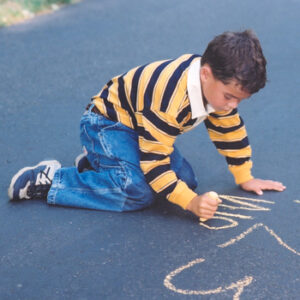
May Begin to Copy Some Capital Letters (41-48 Months)
At this age, children are developing both muscle control and concentration that will help them master more challenging finger and
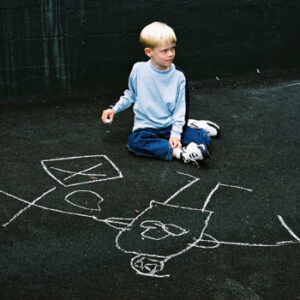
Draws a Person with Two to Four Body Parts (41-50 Months)
Children develop muscular control and concentration to master some precise hand and finger movements during their fourth year of life. Most
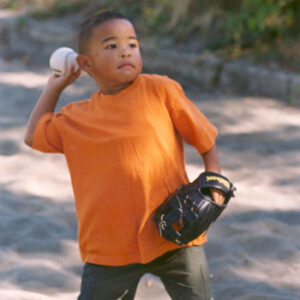
Can Throw a Ball Overhand (42-49 Months)
By age 3, preschoolers have developed large motor skills enough to participate in organized games and some sports. Many are
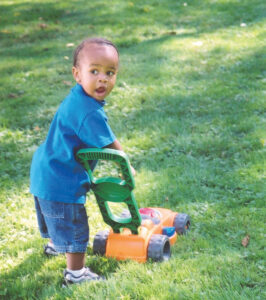
Can Move Forward and Backward with Ease (42-51 Months)
By age 3, preschoolers have well-developed large motor skills. When learning to walk, most toddlers have difficulty moving backward. At
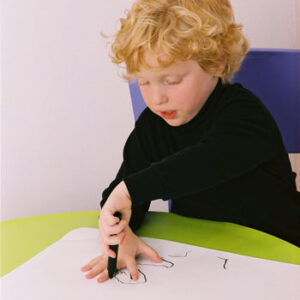
Copies Triangles, Squares, and Other Geometric Patterns (49-60 Months)
During their fifth year of life, preschoolers’ coordination and ability to use their hands is almost fully developed, and they
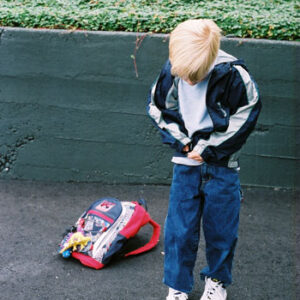
Capable of Dressing and Undressing without Assistance (50-60 Months)
During their fifth year of life, preschoolers’ coordination and ability to use their hands is almost fully developed, and they
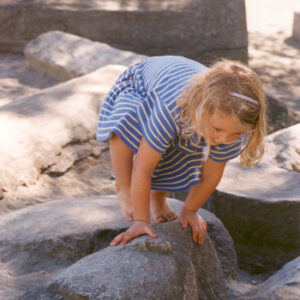
Hops, Somersaults, Swings, and Climbs (51-59 Months)
Four-year-olds have the coordination and balance of adults and demonstrate their skills by descending stairs without the handrail, standing on
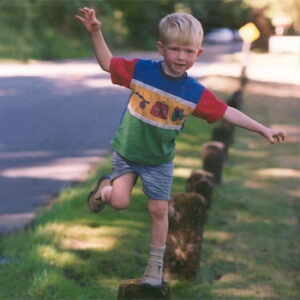
Stands on One Foot for Ten Seconds or Longer (52-58 Months)
Four-year-olds have the coordination and balance of adults and can stand on one foot for ten seconds or longer. They
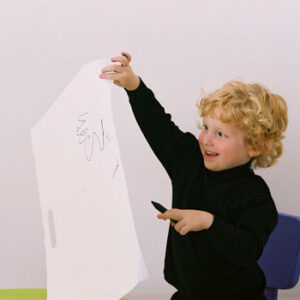
Draws a Person with Body, Some Details (53-57 Months)
During their fifth year of life, preschoolers’ coordination and ability to use their hands is almost fully developed, and they
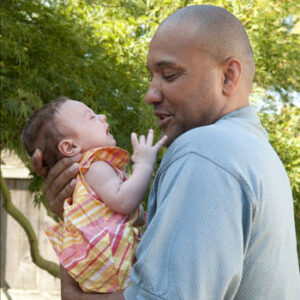
Social and Emotional: Overview (0-6 Months)
Do babies have feelings? Do they have the ability to understand the feelings of others? The surprising answer from the

Book of Jenny: How Babies Communicate
Babies try to tell us what they want or need before they can talk. Part of the fun of parenting
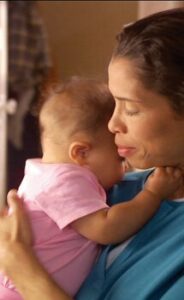
Responding to Baby (0-12 Months)
What is your baby thinking? Well, the answer is – A LOT! That’s right, from the minute your baby is
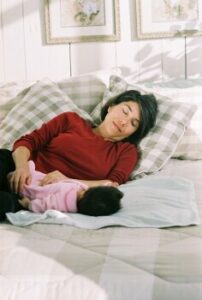
Goodnight, Baby (0-14 Months)
Will your baby ever sleep through the night? The answer is yes! Some nights you need to get up and
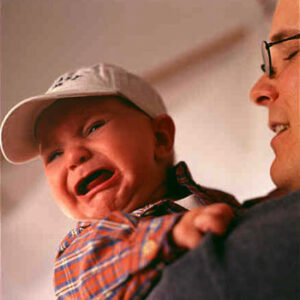
Able to Cry in Response to Another’s Cry (0-3 Months)
Babies treat the sounds of crying differently from other sounds. In one study with 34-hour-old infants, infants cried often when
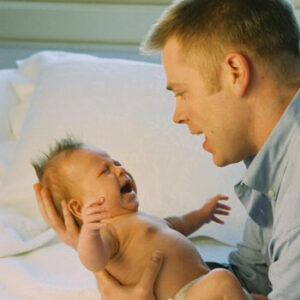
Can Display the Emotions of Distress and Sadness (0-3 Months)
When they feel “distress” or are uncomfortable or in need, even newborn babies have ways of letting their caregivers know,

Capable of Showing Contentment and Joy (0-3 Months)
At birth, infants begin to show basic emotional behaviors. To demonstrate this, researchers carefully studied infants’ facial expressions as they
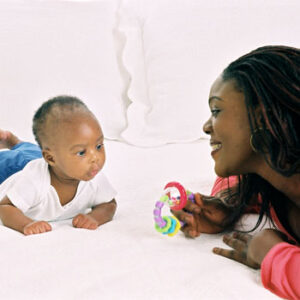
Capable of Showing Interest (0-3 Months)
At birth, infants begin to show basic emotional behaviors, including interest. Interest expressions include wide eyes, focused attention to something,
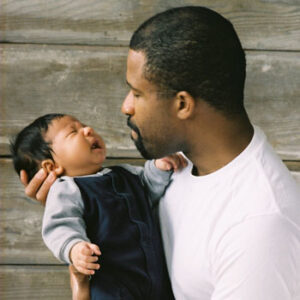
Expresses Disgust (0-3 Months)
Babies will generally show disgust in response to unpleasant tastes. Disgust expressions, which begin in the first few months, can
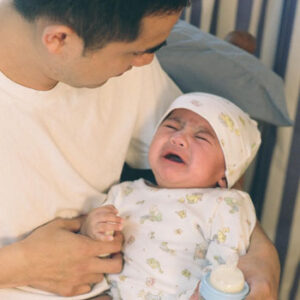
Shows Frustration and Anger (0-4 Months)
Very young babies demonstrate frustration when they are struggling to complete a developmentally difficult task or when they are prevented
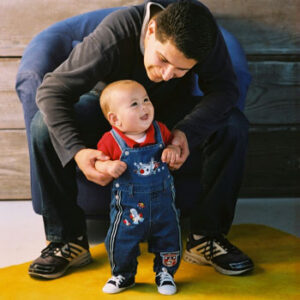
Capable of Imitating Emotional Facial Expressions of Others (0-5 Months)
Soon after birth, babies are already capable of imitating the emotional expressions they see on the faces of others. In
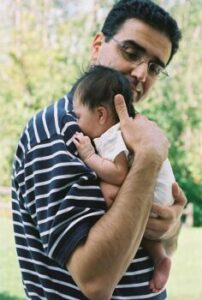
Born to Feel (0-6 Months)
Learn what a sad face means It’s a beautiful summer day. Dad and his 10-week-old son Ryan are relaxing on
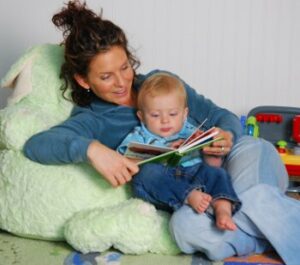
Reading to Babies (0-6 Months)
It’s never too early to begin reading to your child. Reading together not only helps your child learn the sounds
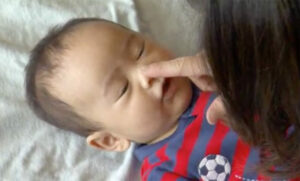
Recognizing Baby Cues (0-9 Months)
In your first 6 months together, getting to know your baby means learning to read their cues. Some cues can
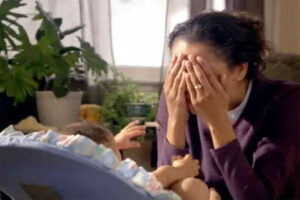
Bubble Talk: Why Caring Responses Make a Difference (1-12 Month)
Babies communicate with their parents and caregivers in many ways. Responding to your baby’s cues positively will help you create
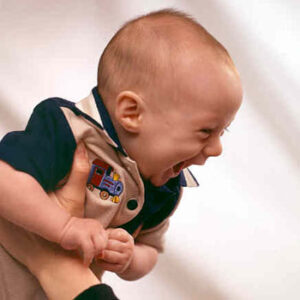
Begins to Develop Social Smile (1-3 Months)
Babies are capable of smiling at birth. At first, these expressions are not truly “smiles” in response to social interactions
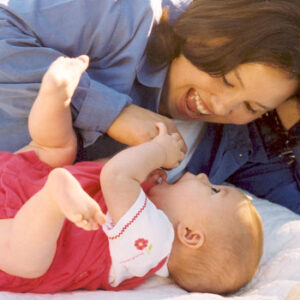
Enjoys Social Play with Caregivers (4-7 Months)
Infants are interested in human faces shortly after birth, and they take huge steps in their abilities to interact with
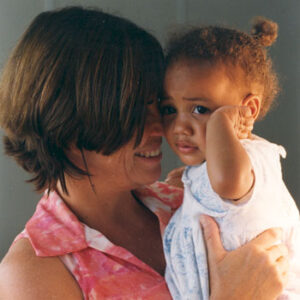
Social and Emotional: Overview (6-12 Months)
Are you my mother? Between 6 and 12 months, most babies show signs of fear around strangers. They also are
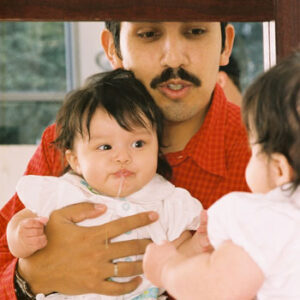
Becomes Interested in Mirror Images (5-7 Months)
Visual awareness increases during months 4 through 7, and babies begin to notice new aspects of their environment. During this
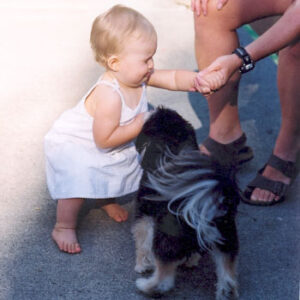
Begins to Show the Emotion of Fear (6-8 Months)
Around 6 to 8 months, most children begin to show fearfulness. Fear develops later than other “basic” emotions because certain
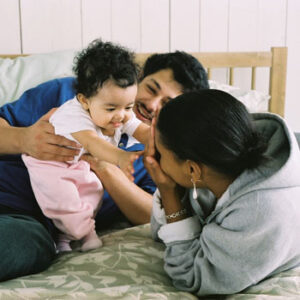
Develops Stronger Preferences for People and Toys (7-12 Months)
Between 8 and 12 months, babies begin displaying stronger preferences for certain people and select their favorite toys, which they
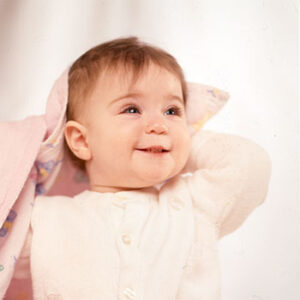
Imitates People during Play (8-12 Months)
Although babies are capable of imitating some facial expressions at birth, they become increasingly able to copy adult actions and
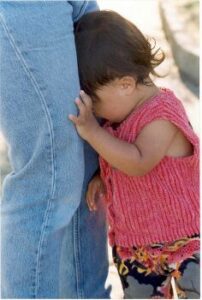
Becomes Increasingly Shy or Anxious with Strangers (8-13 Months)
At around 7 to 8 months, most children begin to show fearfulness around unfamiliar people. This is called stranger anxiety
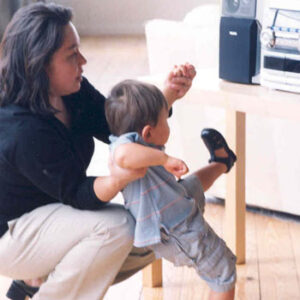
Begins to Test Parental Responses to Behavior (8-15 Months)
Babies are intensely curious about parental responses to their behavior. At this young age, babies begin to do things around
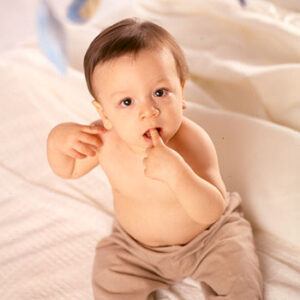
Begins to Look to Others’ Emotions before Acting, Termed “Social Referencing” (9-15 Months)
Starting around 8 to 10 months, children begin to look at the facial expressions of others to help themselves decide
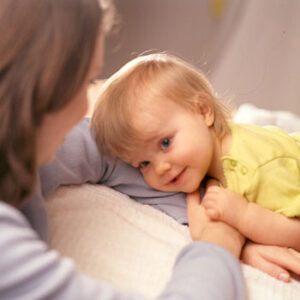
Prefers Primary Caregiver above All Others (9-15 Months)
As babies approach their second year of life, they show sustained preferences for the mother and/or regular caregiver above all
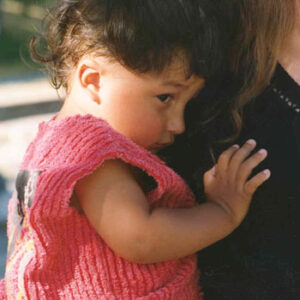
Separation Anxiety Increases (10-18 Months)
Around 6 to 8 months, most children begin to show distress when they are away from their primary caregivers. This
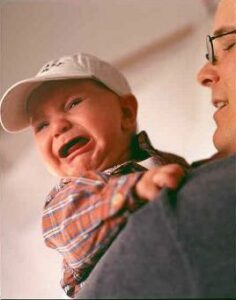
I Want My Mommy
I don’t know you! Scotty is eight months old, and he’s a cheerful and outgoing baby. He always smiles at
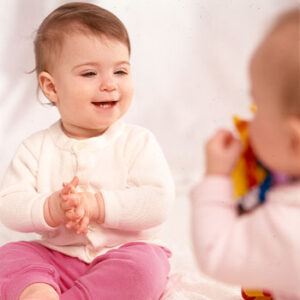
Social and Emotional: Overview (12-24 Months)
In their second year, children take a big step in self-awareness. They begin to understand that they are different from
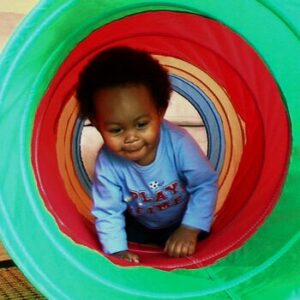
Give Your Child Wings
Why is it important to build a connection? The world can be a very scary place for a toddler unless

I’m Embarrassed
I’m not too young to be embarrassed Sammy is 20 months old, and he just got a new outfit from
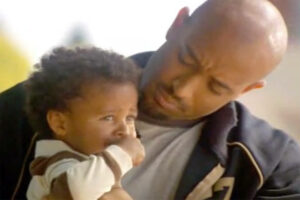
Safari: Making Your Child Feel Secure
Your toddler wants to be independent, but the world can be a scary place. Having you close gives him the
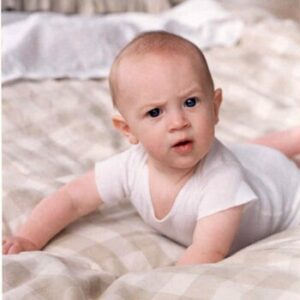
It’s a Stressful Life
How do you teach your child to handle everyday stress? Let’s face it – stress is a part of life.
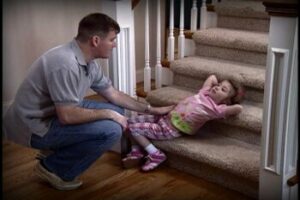
Four Parenting Styles
When dealing with the up-and-down world of emotions, your children naturally take their cues from you. That’s why it’s helpful
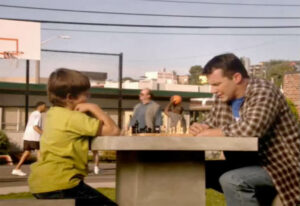
Learning from Dad: How Children Feel About Themselves
Your toddler wants to be independent, but the world can be a scary place. Having you close gives him the
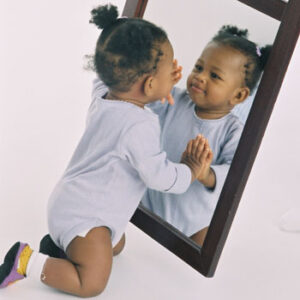
Baby Begins to Develop Self-Awareness (15-24 Months)
Sometime between 15 and 24 months, children take a large step in self-awareness. In an experiment known as the “rouge
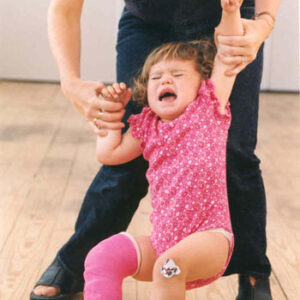
Begins to Show Defiant Behavior (16-24 Months)
As children grow closer to their second birthdays, they take big steps in learning about the desires and feelings of
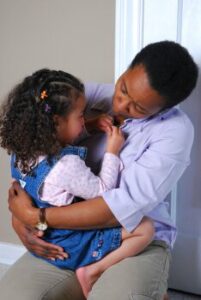
Learning from Dad
Handling big emotions. Tommy: “I hated striking out!”Dad: “I know, but you did a good job of handling your emotion.”Tommy: “It wasn’t easy!”
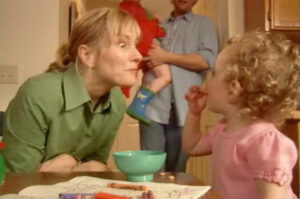
Rough Day: How Children Learn about Stress
Let’s face it, stress is a part of life. And modern life seems to present us with more of it
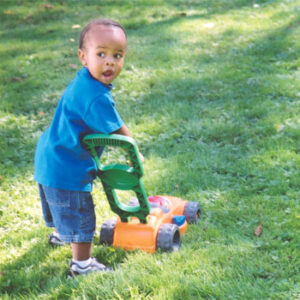
Demonstrates Increasing Independence from Parents and Caregivers (17-26 Months)
Throughout the second year, toddlers will constantly swing back and forth between fierce independence and a desire to cling to
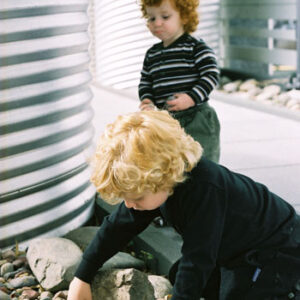
Starts to Display Feelings of Envy (18-24 Months)
Between 15 and 24 months, children take big steps in self-awareness and become more aware of themselves as individuals. They
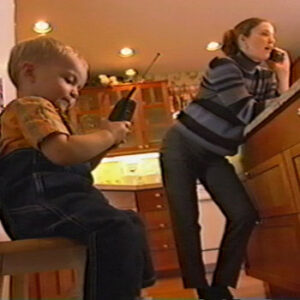
Imitates the Behavior of Others, Especially Adults and Older Children (18-27 Months)
Imitation is a powerful way toddlers learn from others. Instead of simply manipulating household objects as they did during the first
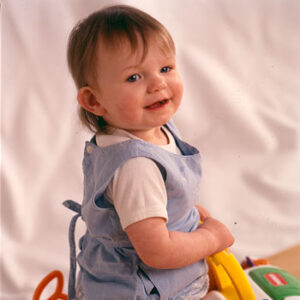
Separation Anxiety Fades (19-24 Months)
Around 6 to 8 months, most children begin to show distress when they are away from their primary caregivers. Children
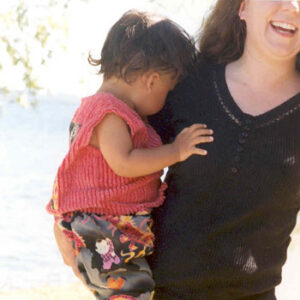
Begins to Show the Emotion of Embarrassment (19-25 Months)
Before they’re about 15 months old, children don’t show the signs of embarrassment–the blushing, smiling, and nervous touching that often
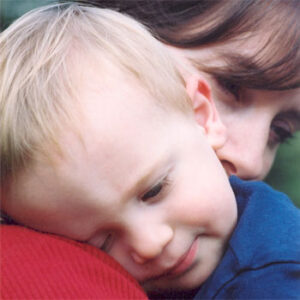
Shows Evidence of Empathy (20-24 Months)
During the second year, children begin to show empathy to others who are upset or hurt. By 18 months, children
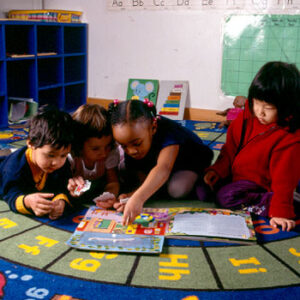
Social and Emotional: Overview (2-3 Years)
New feelings develop in the third year as children become more aware of the expectations and rules around them. Children
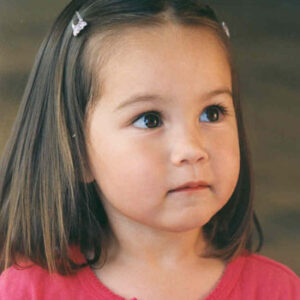
Begins to View Own Behavior against a Standard (24-35 Months)
Sometime between years 2 and 3, children gain the ability to evaluate their own behavior against a standard. As children

Can Take Turns in Games (24-35 Months)
At age 3, children are becoming more independent and more secure. When children learn about taking turns and cooperation from the
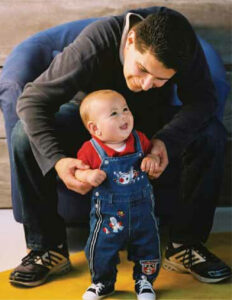
All About Praise
Is there a right way to praise a young child? Is there such a thing as too much praise? Researchers
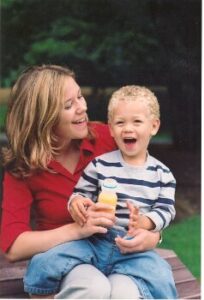
Recognizing Emotions
Connecting through giggles and tears. Emotional moments, whether happy, sad, or fearful, are when kids naturally turn to you for
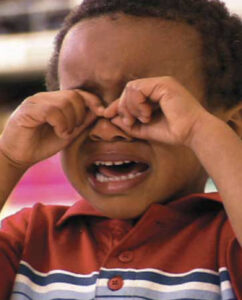
Tantrums Happen
Here Comes a Tantrum! When you least expect it…Tantrums happen! No matter how hard you try to understand your child’s

Tantrums Happen: Connecting during Emotional Moments
Temper tantrums are a normal and very common part of growing up. Ignore those eye-rolling critics. Your child’s extreme display

Life with Baby Brother
New Baby is Home! When a new baby arrives, life changes for everyone. These changes are especially big for an
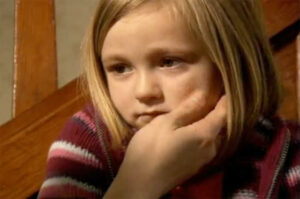
Morning Madness: Valuing a Child’s Emotions
Learning how to communicate and handle feelings are big skills for young children. Sometimes those feelings are hard to recognize,
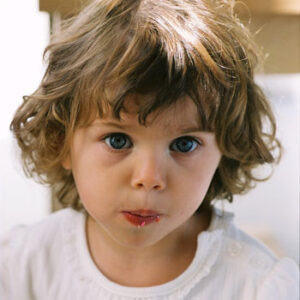
May Experience and Express Guilty Feelings (27-36 Months)
Sometime between years 2 and 3, children gain the ability to evaluate their own behavior against a standard. As children
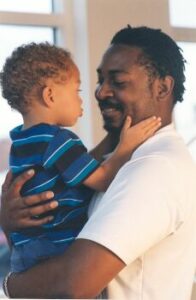
Are You Okay, Daddy?
Big feelings from little ones Some days, it just doesn’t pay to be an adult. Your boss gives you another
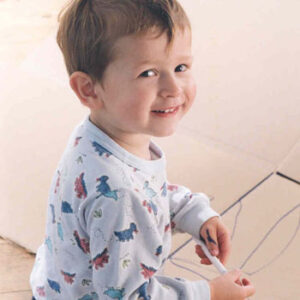
Shows Evidence of the Emotion of Pride (30-36 Months)
Sometime between years 2 and 3, children gain the ability to evaluate their own behavior against a standard. As children
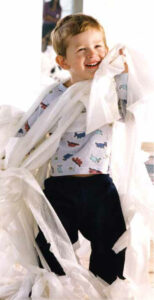
All About Play
Is there a link between how children play and how they learn? Decades of research show that play is important
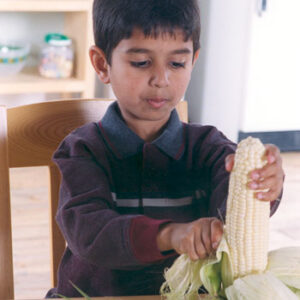
Social and Emotional: Overview (3-5 Years)
“I want to do it myself!” Children are becoming increasingly independent between ages 3 and 5. They are also taking
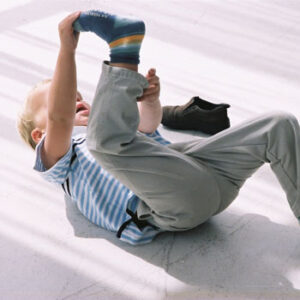
Capable of Dressing and Undressing Self (36-48 Months)
Coordination and the ability to use their hands are almost fully developed by age 4, and preschoolers are gradually learning
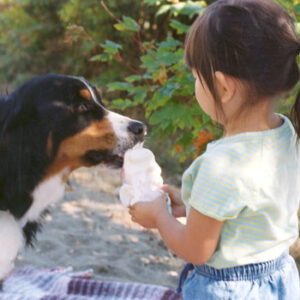
Demonstrates an Increasing Ability to Share (36-48 Months)
Although sharing is a foreign concept for toddlers, many preschoolers are gaining an understanding of and appreciation for the feelings
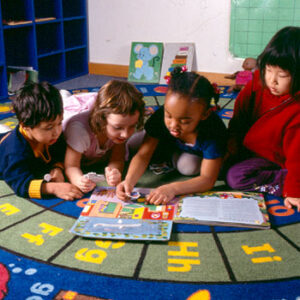
Cooperates More with Other Children (36-50 Months)
Preschoolers enjoy the company of other children and interact with them instead of playing side by side like they did
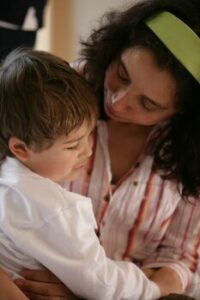
Five Steps of Emotion Coaching
Emotions…we all have them. Everything we do and everything we learn is shaped in some way by the way we
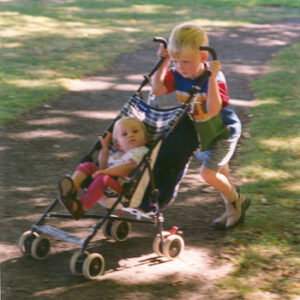
Shows Increasingly Independent Behaviors (36-51 Months)
Preschoolers are becoming increasingly independent and want to make more of their own choices. Eager to prove how capable and
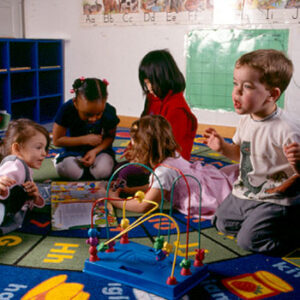
Begins to Negotiate Solutions to Conflicts (38-48 Months)
As children gain an understanding of and appreciation for the feelings and actions of others, they will gradually stop competing
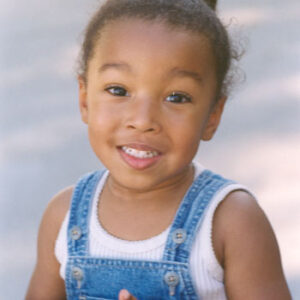
Views Self as a Whole Person–Body, Mind, and Feelings (40-49 Months)
Three-year-olds are gradually learning to use pronouns such as “I,” “me,” “mine,” and “you.” Although they’re still struggling to comprehend
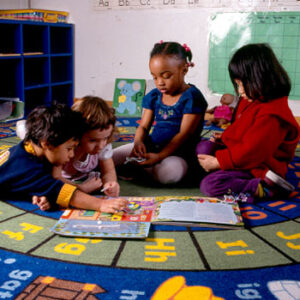
More Likely to Agree to Rules (48-59 Months)
Children still have a simplified sense of morality as they approach their fifth birthdays, but they are exploring the concepts

Wants to Please Friends (49-59 Months)
For 4-year-olds, friends aren’t just playmates – they’re examples of different behaviors, values, and ways of life. Preschoolers want to invite
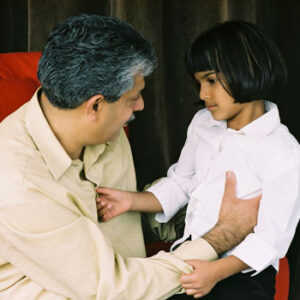
Sometimes Demanding, Sometimes Eagerly Cooperative (50-60 Months)
Preschoolers gain more control over their unpredictable emotional responses by age 4, but they’re still struggling to manage their feelings
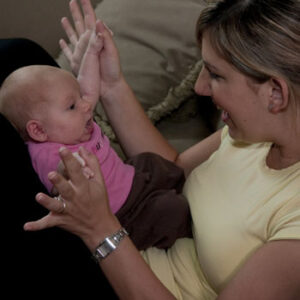
Cognitive and Learning: Overview (0-6 Months)
Cognition refers to how we think–and much more. It includes perception, coordinating information from our senses, memory, speech, and problem-solving.
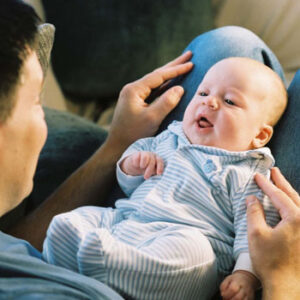
Capable of Imitating Facial Gestures (0-2 Months)
Newborns are not “blank slates” incapable of interacting with others. Newborns only hours old have been found to copy facial
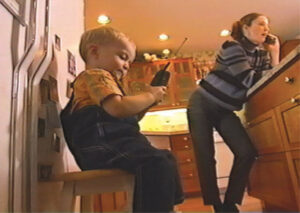
Copycats: How Children Learn from the Actions of Others
Fortunately for parents, young children are amazing students. They’re so good at learning, they do it even when we don’t
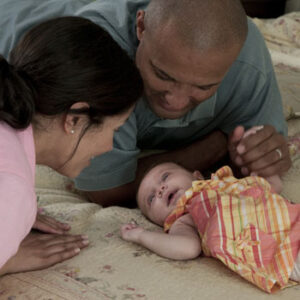
Can Differentiate between Familiar and Unfamiliar Faces (0-3 Months)
Infants quickly become experts at scanning and identifying faces. A newborn infant can distinguish between its own mother’s face and
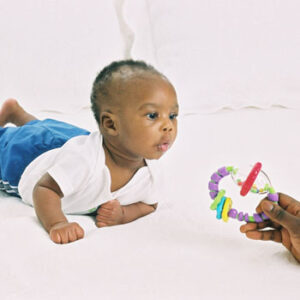
Capable of Mathematical Reasoning: a Quantitative Skill Termed Numerosity (0-3 Months)
At birth, infants can process some types of mathematical information. More specifically, this ability involves distinguishing between different numbers of
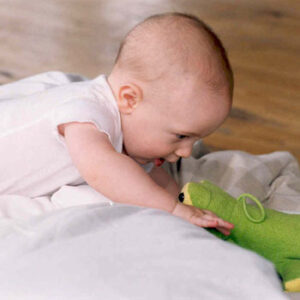
Recognizes that Objects Remain the Same Size and Shape Even If They Are Distant (0-5 Months)
When an object like a ball is moved some distance away, the eye perceives the ball as getting smaller, even
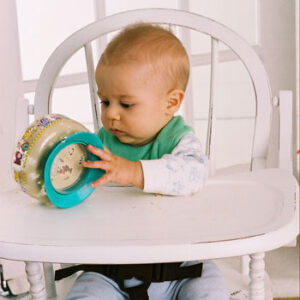
Capable of Making Predictions, Creating and Testing Hypotheses about the Real World (0-6 Months)
Infants are active learners at birth. They are especially good at using their developing physical skills to interact with the

Capable of Demonstrating Certain Types of Memory (0-7 Months)
All the physical, emotional, and face-to-face experiences that infants have regularly form a network of unconscious expectations and reactions to
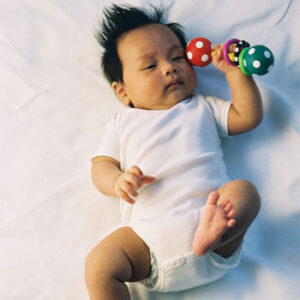
Cross-Modal Perception: Can Relate What They Feel with What They See (1-4 Months)
For infants to make sense of the sights, sounds, and feelings that buzz around them, they need to coordinate this
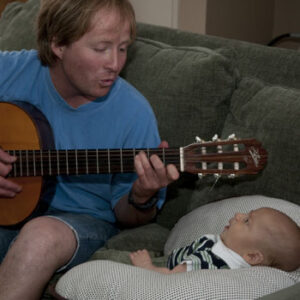
Language Learning Begins (1-6 Months)
It’s never too early to enjoy a “conversation” with your baby! Neuro-imaging studies show us that long before a baby
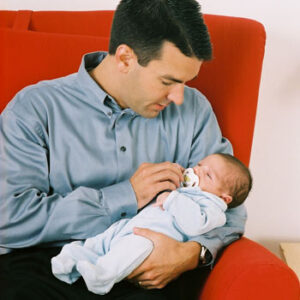
Cross-Modal Perception: Can Relate What They Hear with What They See (2-4 Months)
Young infants are also capable of relating what they hear with what they see. One study tested two-month-old infants’ ability
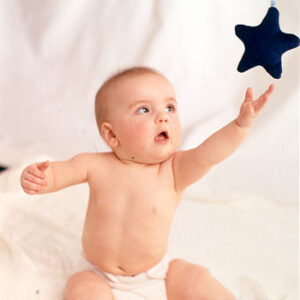
Struggles To Get Objects That Are Out Of Reach (3-6 Months)
At 4 months, babies begin coordinating their emerging perceptive abilities to struggle to get objects that are out of reach.
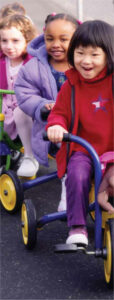
Explores the World (4-7 Months)
Although newborns react primarily by reflex, babies begin making choices and actively exploring the world around them at 3 to
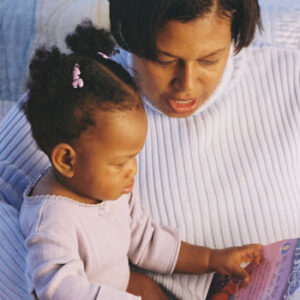
Cognitive and Learning: Overview (6-12 Months)
Between six and twelve months, babies eagerly explore the world around them. When they’re not playing peek-a-boo, they will grab
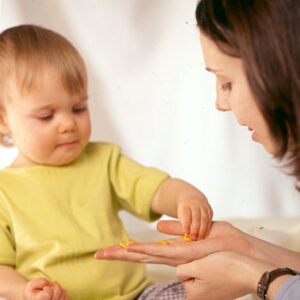
Can Perform Simple Addition and Subtraction Exercises (5-10 Months)
Several studies have shown that infants understand some basic concepts about numbers. By around 5 months, infants show surprise when

Acquires the Notion of Object Permanence (That a Hidden Object Still Exists Even If One Can’t See It) (7-12 Months)
Before 8 months, a baby will think that an object has disappeared if it is covered or hidden from view.

Memory Improves (8-12 Months)
At around 8 months, there is a change in the way that infants remember. Before, they could recognize objects and
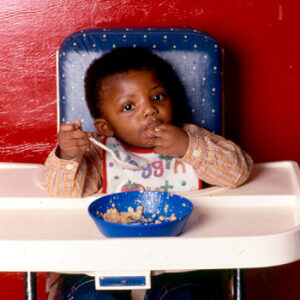
Attempts to Use Objects “Correctly” (Using a Phone, Drinking from a Cup, etc.) (8-15 Months)
Between 8 and 12 months of age, babies become increasingly conscious that items have names and particular functions associated with
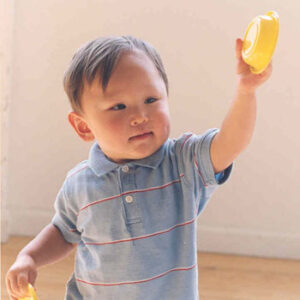
Explores Objects in Many Different Ways (Shaking, Banging, Throwing, Dropping) (8-16 Months)
As they approach their first birthday, babies begin experimenting with everything they find: dropping, rolling, shaking, throwing, submerging, or waving
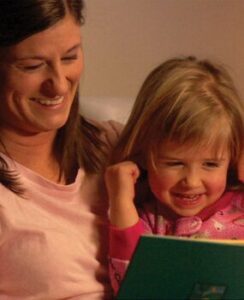
Take a Break with Books
Cereal is on the floor, the laundry is piled high, and your toddler comes to you with her favorite book
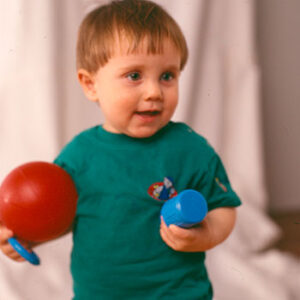
Can Distinguish between Two vs. Three Objects (9-12 Months)
By 7 months, infants can tell the difference between different numbers of objects and match the number of sounds they
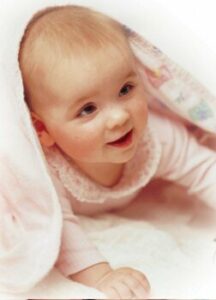
Peek-A-Boo
Young children are great explorers From birth to age five, children learn an astonishing amount about how the world works.
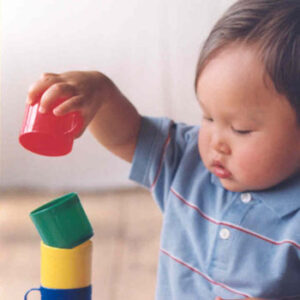
Cognitive and Learning: Overview (12-24 Months)
In their second year, children become more creative in exploring the world. They continue to drop, throw, and bang objects
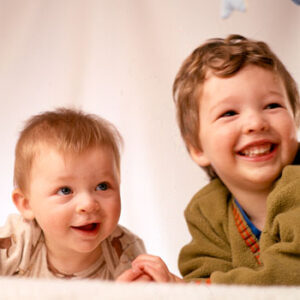
Recognizes the Difference between Self and Other People (12-20 Months)
Between 12 and 15 months, children increase their awareness of themselves as different from others. Although self-awareness develops more fully
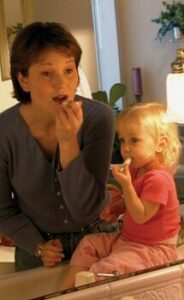
Copycats
The world’s best copycats. Babies are born learning from you. Even at birth, infants can watch what you do and
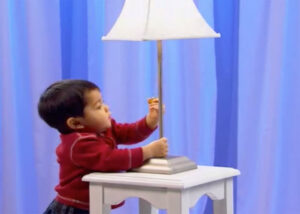
Testing 1,2,3: How Children Learn through Repetitive Behavior
When children begin their second year, it can be a very difficult time for parents and caregivers. Children at this
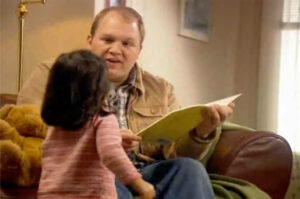
Dad’s Club: Make Reading Fun
“Daddy! Read me a story!” he says while you tuck him between the sheets. And before you know it, he’s
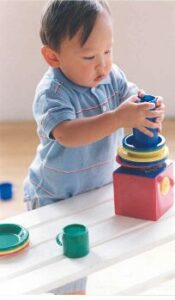
Baby See, Baby Do (15-24 Months)
Babies can remember a lot For decades, scientists didn’t think babies could remember much. Although parents and caregivers suspected that
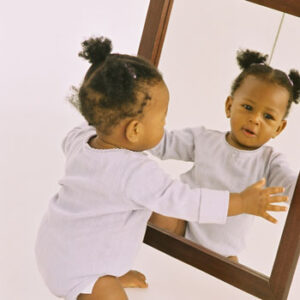
Recognizes Own Facial Features (15-24 Months)
Sometime between 15 and 24 months, children take a large step in self-awareness. In an experiment known as the “rouge
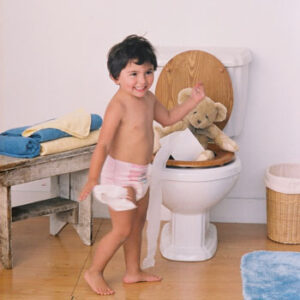
May Show an Interest in Being Potty Trained (16-25 Months)
Many toddlers are ready for toilet training after their second birthday, but early training is possible with some children. If
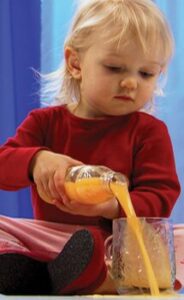
Testing 1, 2, 3
Is your toddler getting into everything? Has your “little angel” started coloring on your walls? Does she throw her cereal
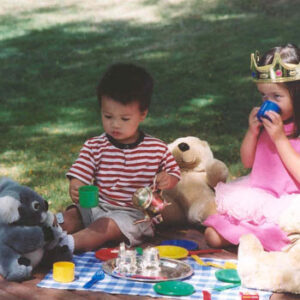
Begins to Pretend in Play (18-24 Months)
Play begins when infants start exploring objects and, at around 18 months, evolve to using them for their intended purpose.
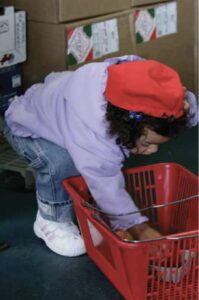
Cognitive and Learning: Overview (2-3 Years)
Between two and three, children become better problem solvers. They can make mechanical toys “work” and can put together puzzles
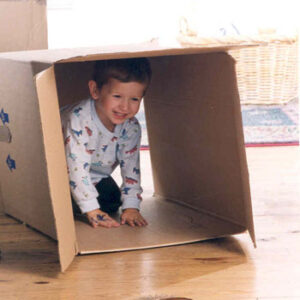
Pretend Play Includes Symbolic Use of Objects (24-36 Months)
Pretend play includes the symbolic use of objects. Once an object has been given an “identity” (for example, a block
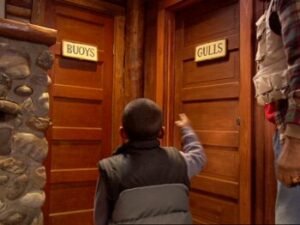
I Know This Word
Words are all around us! Just one more stop before you head home. So into the store, you go. You’re
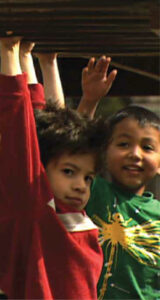
Develops an Understanding of Other People’s Intentions and Goals (25-36 Months)
The beginning of understanding other people’s minds is gradual; at 9 months, an infant may exhibit “joint attention,” the ability
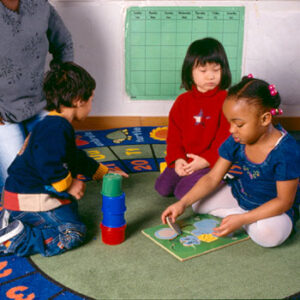
Capable of Completing Puzzles with Three or Four Pieces (26-36 Months)
By the end of their second year, toddlers begin to understand the relationship between objects, solve simple jigsaw puzzles, and
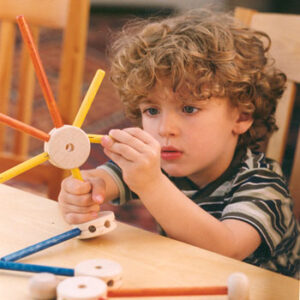
Can Make Mechanical Kinds of Toys “Work” (28-36 Months)
The learning process becomes more thoughtful for toddlers as they approach their third birthday. They begin solving problems and performing mental

Capable of Some Deception (28-37 Months)
When children develop the ability to deceive others is controversial, and some researchers believe that “lying” does not truly emerge
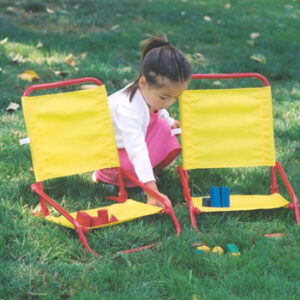
Cognitive and Learning: Overview (3-5 Years)
Between three and five, children become more sophisticated thinkers. They have a clearer sense of time, they can count objects
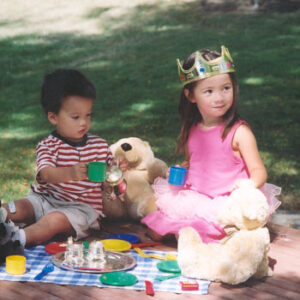
Increasingly Inventive Fantasy Play (36-48 Months)
Preschoolers enjoy vivid fantasy lives and imagine themselves in various roles, from firefighters and dancers to doctors and superheroes. Taking on
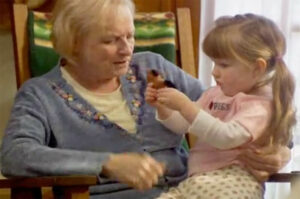
Story Time: Helpful Skills for Pre-Literacy
Sharing books is a great way to help your child learn to read and write. But there is something just
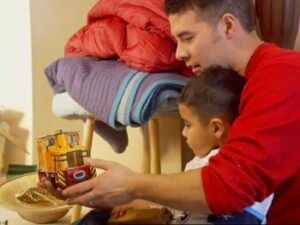
Tell Me a Story
Stories are a great way to connect! “That’s a picture of Grammy when she was a little girl. She loved

Capable of Approaching Problems from a Single Perspective (38-50 Months)
When faced with specific challenges, three-year-olds approach problems from a single perspective. They haven’t yet developed the ability to see
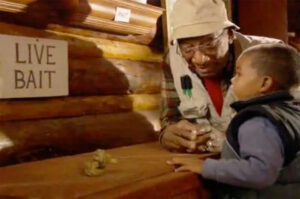
Gone Fishing: Understanding that Written Language Carries Meaning
Beginning at an early age, many children begin trying to understand the signs, labels, logos, and printed words they see
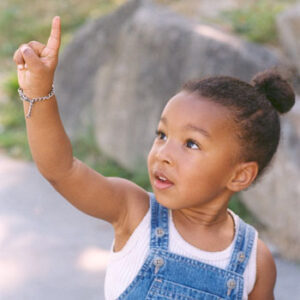
Capable of Verbal Knowledge of a Few Numbers (39-48 Months)
Preschoolers understand the concept of counting and may know a few numbers by the end of their second year. References:
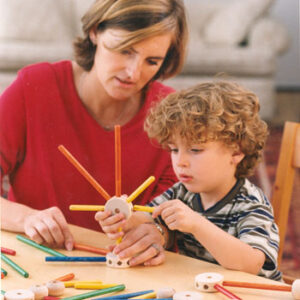
Can Correctly Name Some Colors (40-48 Months)
Although children can distinguish among colors at an earlier age and may learn color words, they may not consistently name
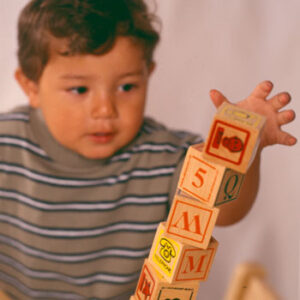
Learns to Count Objects Accurately (40-49 Months)
Once children begin to talk, counting soon follows. At first, this counting is not very precise, and the words for
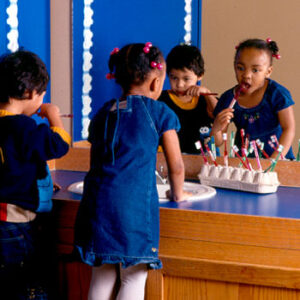
Begins to Have a Clearer Sense of Time (42-50 Months)
Children develop a much clearer sense of time at about 3 years of age. They know their daily routines and show
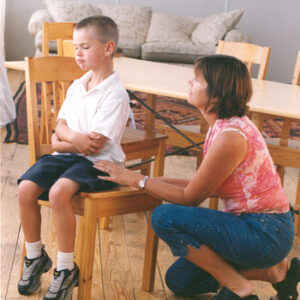
Becomes Capable of Deliberate Lying (46-53 Months)
When children develop the ability to deceive others is somewhat controversial. Although some researchers believe children can be deceptive by
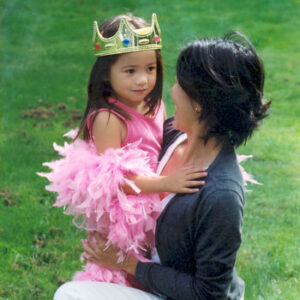
Realizes Other People Can Have Inaccurate Perceptions of the World (48-57 Months)
Children gain new insights into how other minds work between ages 4 and 5. Part of this understanding includes realizing
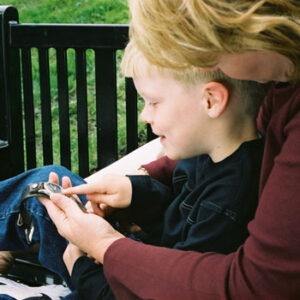
Shows Increased Sophistication in Understanding the Concept of Time (49-59 Months)
Preschoolers understand that days are divided into mornings, afternoons, and nights and that years consist of four seasons. When they
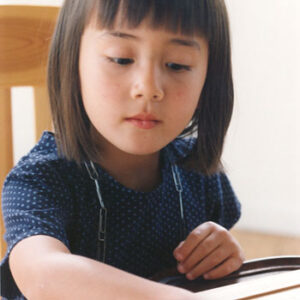
Realizes that People May Have Different Visual Views of the Same Object (50-58 Months)
Before children are about 4 years old, they don’t understand that their view of an object and someone else’s view
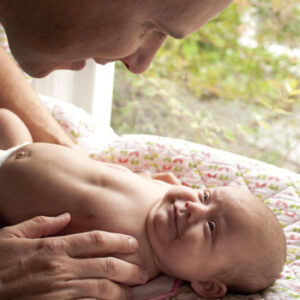
Language and Communication: Overview (0-6 Months)
People are born to talk to each other, and nowhere is this more apparent than in a developing child. Babies
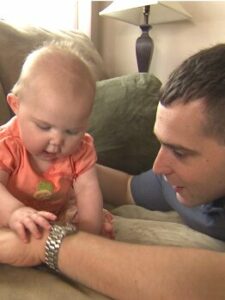
Getting In Tune with Baby
How do I know what my baby wants? Everyone knows that babies cry when they are upset. They smile when
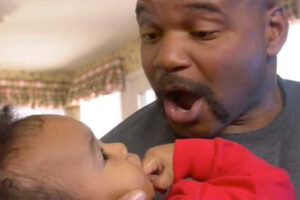
Parentese: Why It’s Never Too Early to Start a Conversation (0-6 Months)
Researchers call the special way we talk to babies “motherese” or “parentese.” This sing-song speech, often accompanied by exaggerated facial
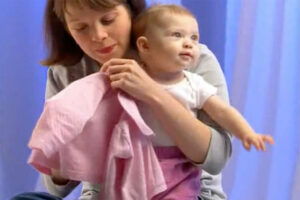
Talking to Baby (0-12 Months)
How do you talk to your baby? Would you say, “hellooooo, sweeeeetie! How’s my baaabeee? Such a pretty baaabeee.” Does
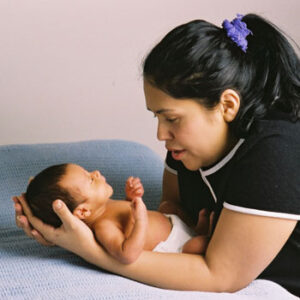
Prefers Sounds of Familiar Language to Those of Other Languages (0-3 Months)
At birth, infants can respond to human voices. They are also capable of distinguishing between the sounds of different languages,

Can Discriminate between Syllables within Words (0-4 Months)
Within the first few days after birth, infants are sensitive to the stress patterns or rhythms of the words they
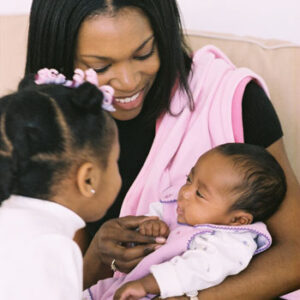
Can Discriminate Mother’s Voice from Other Women’s Voices and Prefers Her Voice to Other Women’s Voices (0-4 Months)
At birth, infants can respond to human voices. They are also capable of distinguishing among the voices of different people,

Capable of Spontaneous “Ooh” Sound (0-4 Months)
In their first months, infants start making sounds other than crying. Cooing sounds often occur when a baby is quiet,

Heavy Reliance on Communication through Crying, which Can Occur for Several Hours a Day (0-4 Months)
For the first several months, crying is an infant’s most common form of vocalization. Some cries may sound different from
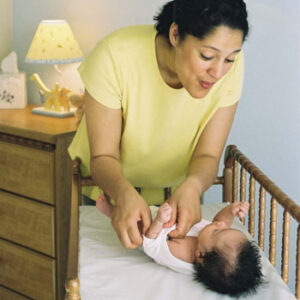
Pays More Attention to Human Voices than to Other Sounds (0-4 Months)
At birth, infants show the ability to respond to human voices and speech. In one experiment, infants only a few
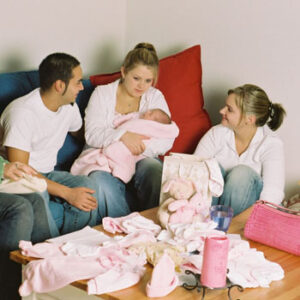
Smiles at the Sound of a Familiar Voice (0-4 Months)
Babies prefer human voices to other sounds and are especially drawn to the voices of their caregivers. After 1 month,

Talking with Infants (0-9 Months)
Infants start communicating right from birth. Crying, smiling, vocalizations, looking at your face, and looking away are all ways your
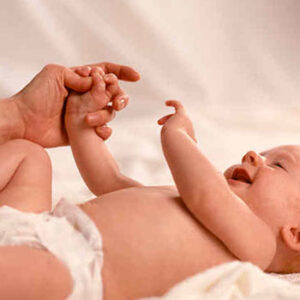
Babbling Commences (1-3 Months)
Many infants begin babbling routinely at around 4 months, often entertaining themselves for long periods by producing new sounds (for
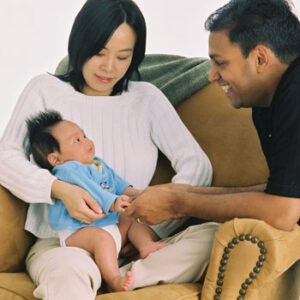
Attempts to Imitate Some Sounds (1-4 Months)
After 2 months, some infants begin repeating a few of the exaggerated vowel sounds they hear when their caregivers speak
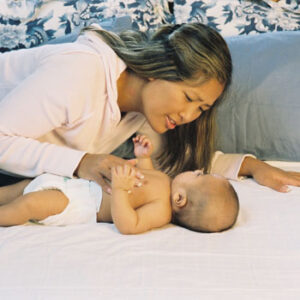
Coos Back and Forth with Caregiver (1-4 Months)
In their first months, most babies begin to make cooing sounds. Some believe infants at this age begin to participate
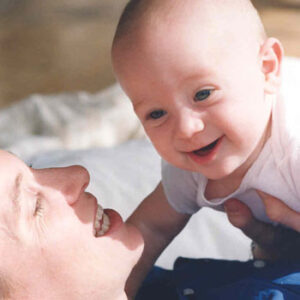
Begins Grouping Language Sounds into Specific Categories (1-6 Months)
Long before babies begin to learn specific words, they engage in an important sound-sorting process that enables them to distinguish
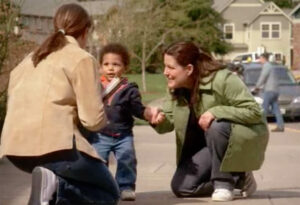
Careful, Frank: Communicating through Emotional Expressions (2-24 Months)
As adults, we do this all the time to obtain feedback from the world around us, but it’s fascinating to
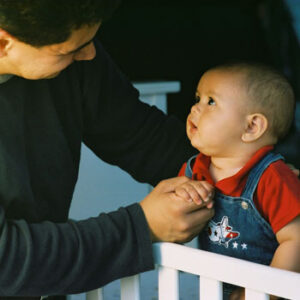
Begins Lip Reading (2-8 Months)
When infants are spoken to, they will often pay special attention to a person’s lip movements. Even at 10 to
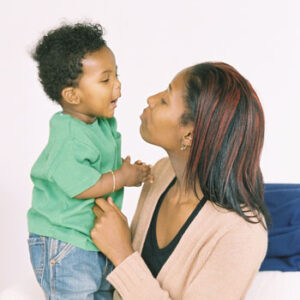
Language and Communication: Overview (6-12 Months)
Between 6 and 12 months, babies are actively processing the language sounds they hear. They are learning to take “turns”
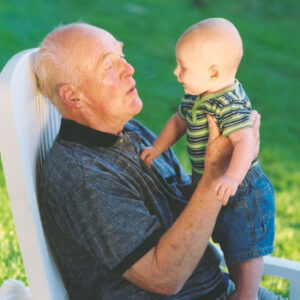
Capable of Responding to Own Name (4-5 Months)
A baby’s name is generally used much more often than other words. Studies show that babies are early as 4
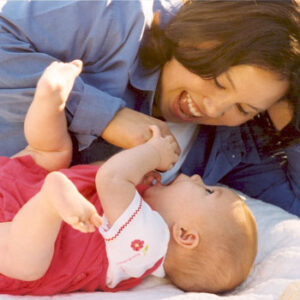
Attempts to Respond to Sounds by Making Sounds (4-7 Months)
By 4 months, many babies begin listening for the individual sounds in words, noticing how vowels and consonants combine into
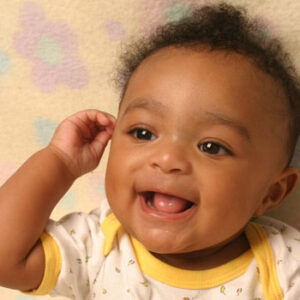
Can Verbalize Happiness and Displeasure (4-7 Months)
Babies begin voicing their emotions and desires frequently at 5 or 6 months, laughing to show pleasure and crying when
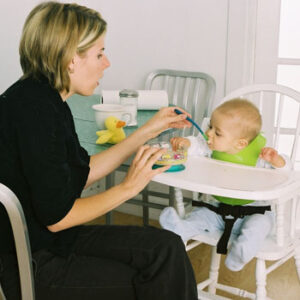
Capable of Responding to “No” (5-7 Months)
Although children don’t yet understand what words mean, they may stop doing something when a parent or caregiver says “no.”
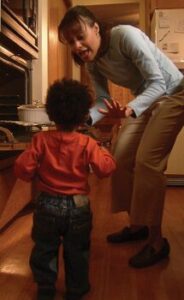
Mommy, Is This Okay? (6-12 Months)
Guiding your baby with your facial expressions and words. Eleven-month-old Cameron can walk, and he can go just about anywhere
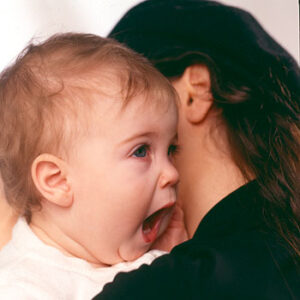
Responds To and Begins To Map Sounds of Language (6-12 Months)
Between 6 and 12 months, babies can literally “hear” the specific sounds of all languages spoken. When compared to adults,

Snuggle Up for Reading (6-24 Months)
“Mommy! Mommy! Book! Book!” he says before you tuck him in for an afternoon nap. You grab his favorite book,
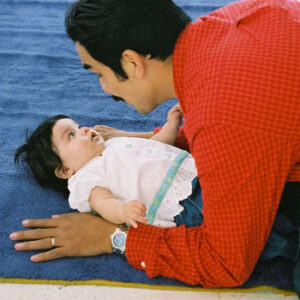
Babbling Includes Short Strings of Consonants (6-9 Months)
By 4 months, babies begin listening for the individual sounds in words, noticing how vowels and consonants combine into syllables,
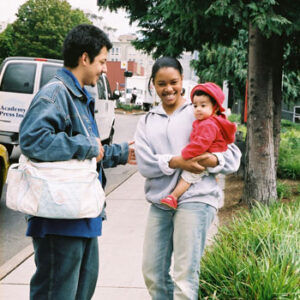
Learns to Wait until Someone Else Is Finished Talking before Beginning to Speak (7-10 Months)
During their first 6 months, infants will often coo or babble while their caregivers are talking to them. By 7
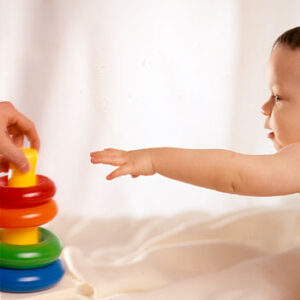
Can Respond to Simple Verbal Requests (8-10 Months)
Even though babies often say their first words at around 12 months, most have learned quite a few words by
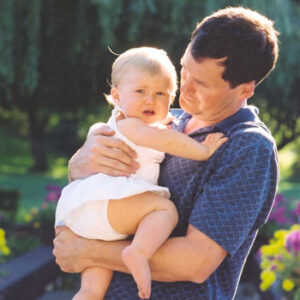
Begins to Use Gestures and Sounds to Communicate (8-11 Months)
By 8 to 10 months, babies attempt to communicate with others using gestures and pre-verbal sounds. There are two common
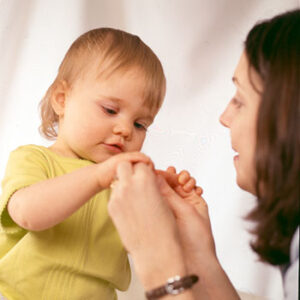
Capable of Uttering “Dada” and “Mama” (8-12 Months)
Between 8 and 12 months, babies may stumble on words like “mama” and “dada” accidentally, learning what they mean when

Begins to Understand that Words Can Refer to Physical Objects (9-12 Months)
Around 9 months, many infants understand that some words refer to specific objects. Although they can’t yet speak words, many
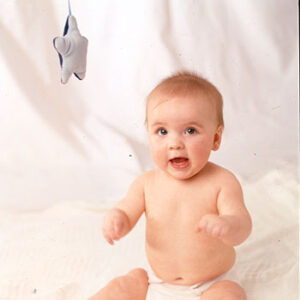
Babbling Appears Less Random; Inflections Apparent (9-14 Months)
Between 8 and 12 months, the coos, gurgles, and other “baby” sounds become more like the sounds of the home
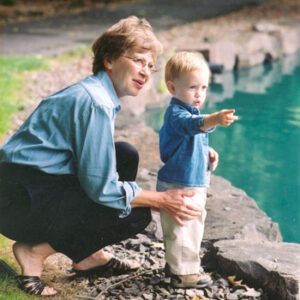
Language and Communication: Overview (12-24 Months)
Around their first birthdays, many children say their first words. Within six months or so, many children have a “word

Begins to Imitate Spoken Words (10-14 Months)
At 10 months, some infants will begin to repeat back words they hear, although they may not yet know that
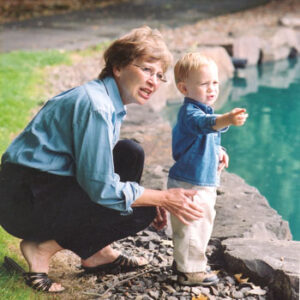
First Words Are Often Spoken at This Time (12-19 Months)
The remarkable achievement of using words to represent things usually begins around 12 months, but babies can vary by several
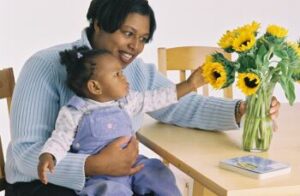
What a Chatterbox
Naming objects is the First step If you’ve spent much time around young children, you’ve probably had conversations like this:
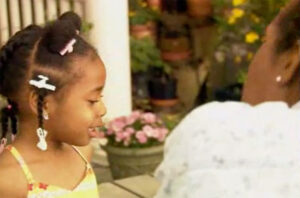
Keep Talking: The Importance of Conversation (12-60 Months)
Talking with an 18-month-old is hard for those who don’t speak toddler language! Some words toddlers say sound just right.
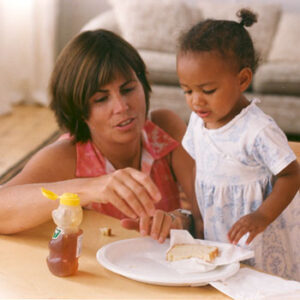
Recognition of Sounds of Own Language Complete; May Have Difficulty Discriminating Certain Sounds of Foreign Languages Later (13-22)
Between 6 and 12 months, babies can literally “hear” the specific sounds of all languages spoken. When compared to adults,
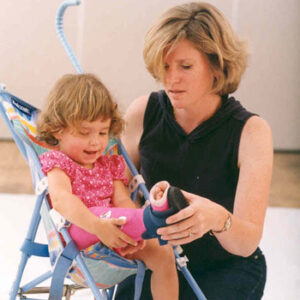
Identifies Names of Familiar People, Objects, and Body Parts (14-24 Months)
Although there is a tremendous variation in the age that toddlers begin speaking recognizable words, their first few words generally
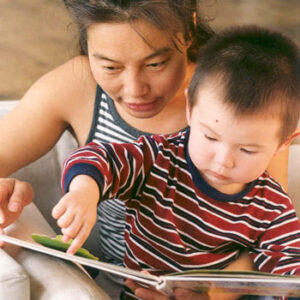
Can Correctly Identify a Picture with its Spoken Name (14-25 Months)
Toddlers make visible progress in their comprehension skills early in their second year, demonstrating their growing understanding of language with
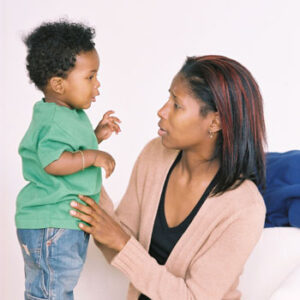
Commonly Uses Two to Four-Word Sentences (15-25 Months)
At the end of their second year, toddlers begin communicating in two- to four-word sentences. This process begins when children
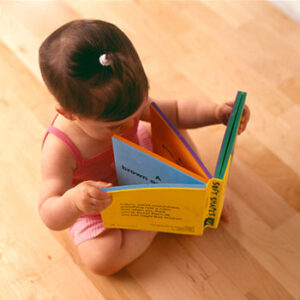
Typically Has a Vocabulary of 200 Words (16-24 Months)
Research has shown that children at 2 years can have a vocabulary of around 200 words, although some normal children
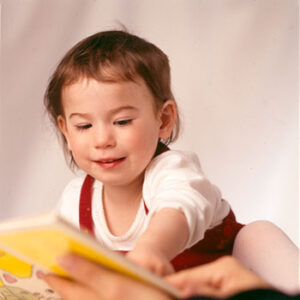
A Rapid Increase in Vocabulary Begins Now: Infants Add 10-20 Words per Day during This Period (18-24 Months)
Sometime around 18 months, most children experience a “word spurt” (or “naming explosion”) that leads to large increases in their

Begins to Use Combinations of Words in Meaningful Ways (20-26 Months)
Before they reach 20 months of age, many children begin to add single words together when they speak. These early
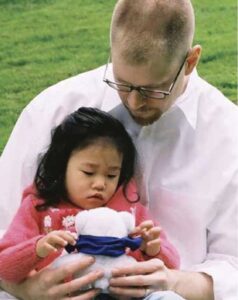
Language and Communication: Overview (2-3 Years)
In their third year, children’s language skills continue to grow at an astonishing rate. They begin to use pronouns (“I”
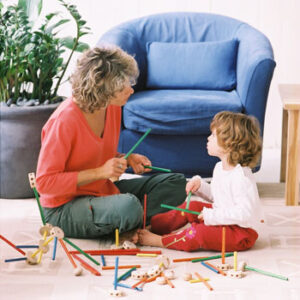
Can Utter a Grammatically Correct Declarative Sentence (24-31 Months)
As children learn to speak in sentences, they also begin to use basic forms of correct grammar. Although children may
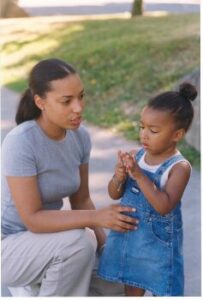
Keep Talking
Building language every day. Learning to talk is harder than it seems. If your child makes mistakes, don’t worry, he
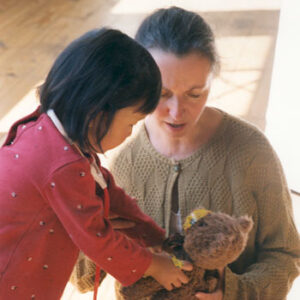
Strangers Can Understand Most of the Words Spoken by the Toddler (26-36 Months)
By age 3, most children speak clearly enough that strangers can understand most of what they say. Despite this, children may

Uses Pronouns (I, You, Me, We, They) and Some Plurals (26-36 Months)
During their third year, children begin using pronouns and plurals in their speech and understand the concept of “mine.” They
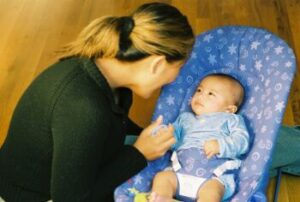
Look Who’s Talking
Is that babbling and cooing designed to make us melt? The house is quiet. The baby has gone down for
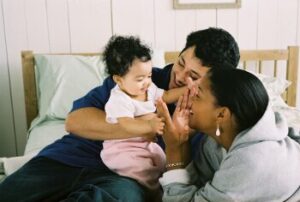
Two Languages Spoken Here
Learning two languages“Daddy? Can I have some cookies?” Maria asks.“I don’t know Sweetheart. Go ask your mom.”Maria catches her mom
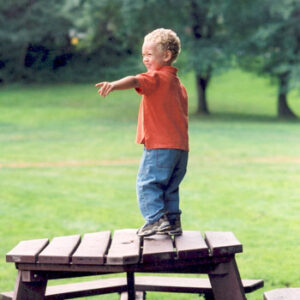
Understands Physical Relationships such as Under, Over, and In (28-37 Months)
It takes some time before young children can grasp the meanings of words that describe physical relationships. But during the
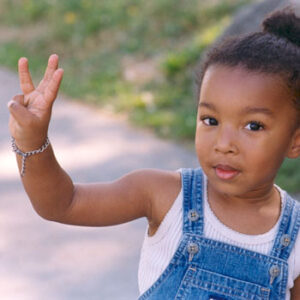
Can Say Name, Age, And Gender (29-38 Months)
Most children delight in knowing and proclaiming their name and age. References: Shelov, S. P. (Editor-in-Chief). (2004). Caring for Your
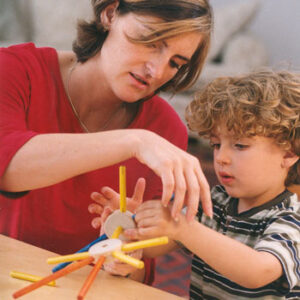
Understands Most Of What Adults Say (30-36 Months)
By age 3, children can generally understand most sentences and most of what adults say. References: Shelov, S. P. (Editor-in-Chief).

Vocabulary Consists Of 1,000 Words (32-39 Months)
Around age 3, most children have a vocabulary of around 1,000 words. However, this may vary by a large amount,
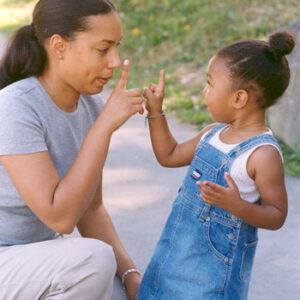
Language and Communication: Overview (3-5 Years)
It’s storytime! By age 5, most children can communicate effectively, and many enjoy telling creative stories. Their sentences get longer
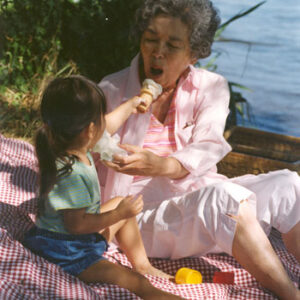
Can Ask a Grammatically Correct Question (35-41 Months)
Before age 3, children’s questions are generally incomplete, depending on words like “where” or “what” and a rising tone at
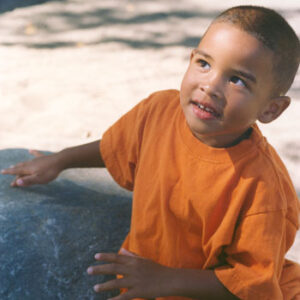
Inserts Articles, Auxiliary Verbs, and Grammar Not Previously Seen (37-44 Months)
In the third year, children use language in increasingly sophisticated ways. This includes making sentences that use articles (“a” or
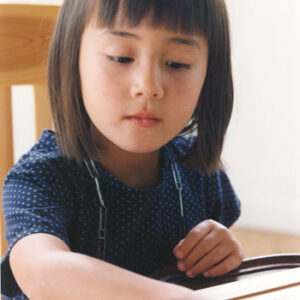
Understands the Concept of “Same” and “Different” (39-48 Months)
During their fourth year, children begin to compare things in terms of similarities and differences. This is an important analytical
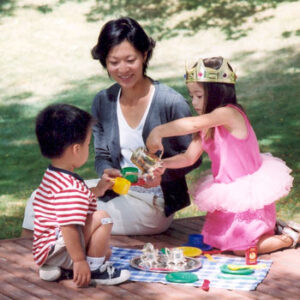
Capable of Speaking in Sentences of Five to Six Words (40-48 Months)
At age 3, most children have active vocabularies of 300 or more words, talk in sentences of five or six
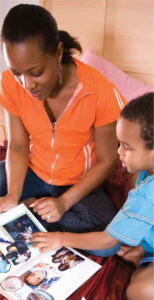
Speaks in Complex Sentences (51-59 Months)
Language skills blossom around age 4, and preschoolers can now pronounce most sounds of the English language. Their vocabularies expand to
